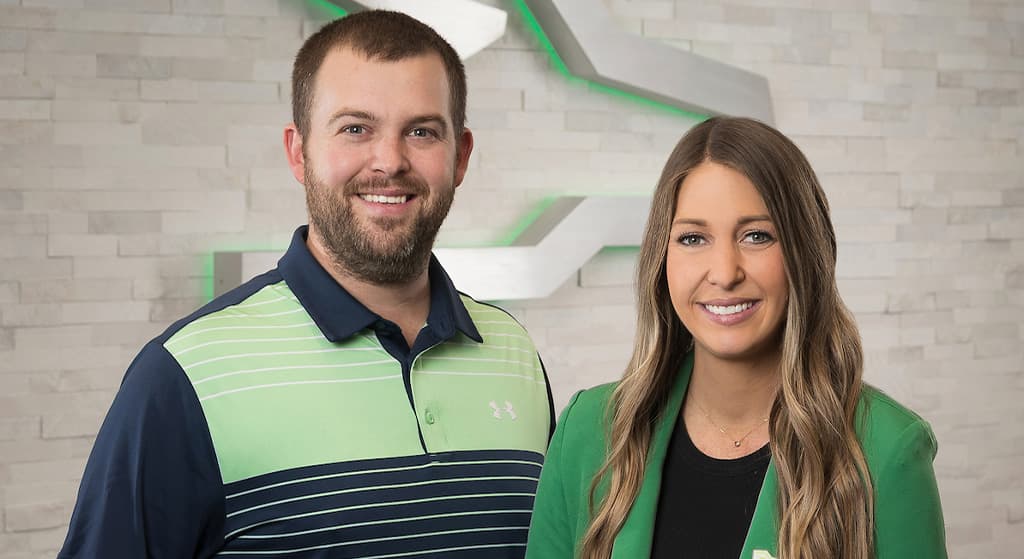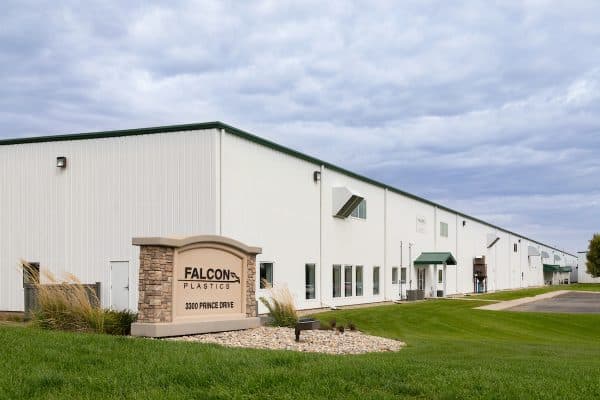Falcon Plastis at 50 : Integrity & Innovation

In 1974, Don Bender left a secure job in plastics manufacturing to strike out on his own. Frustrated by the industry’s tolerance for cutting corners and misleading customers, he set up Falcon Plastics in Brookings, South Dakota, with a simple proposition: make products with integrity and treat customers, suppliers, and employees as true partners.
Fifty years later, Falcon Plastics has grown into a multi-facility manufacturer serving markets from medical devices to industrial components, with plants in South Dakota, Tennessee, Oregon, and China. It remains family-owned—and profitable every single year of its existence.
At the helm today is Don’s granddaughter, President Jenn Barlund, who is steering Falcon into a future defined by automation, strategic partnerships, and workforce development—without sacrificing the culture that built the company.
A Company Built on Partnerships, Not Transactions
Falcon’s business is custom injection molding and contract manufacturing—services that demand both precision and flexibility. Its customer base includes multiple fortune 500 companies. One recently approached Falcon about 2-shot molding. The company didn’t have the capability at the time but quickly invested in the technology.
“That’s who we are,” Barlund says. “When a strategic partner brings us an opportunity, we find a way to make it happen.”
The same philosophy applies to suppliers. Falcon resists the temptation to chase the lowest material costs, instead maintaining long-term relationships that pay off when supply chains tighten. During the pandemic, that loyalty meant Falcon stayed at the front of the allocation line while others scrambled for raw materials.
It’s an approach that mirrors Don Bender’s founding principles. In one emblematic moment, Falcon walked away from a top medical customer after the client openly declared they were willing to “cheat anybody for a penny.” The account was profitable and strategically attractive, but the values misalignment was non-negotiable.
Fifty Years of Steady, Profitable Growth
Falcon’s financial track record is rare in manufacturing: it has never posted a loss in five decades. Part of that resilience comes from diversification—serving multiple industries reduces vulnerability to sector-specific downturns. Another factor is a deeply rooted operational discipline built over years of steady expansion.
From its single Brookings plant in 1975, Falcon added facilities in Madison, South Dakota; Lexington, Tennessee; and Tigard, Oregon (via a 2019 acquisition). A manufacturing presence in China supports global customers and supply chain flexibility.
Each site has its own history—Lexington and Madison are marking 30-plus years in operation—yet they share a common culture. That culture is reinforced by unusually long employee tenures: the average is 10 years, and some team members have been with the company for nearly four decades.
“When we celebrated our 50th anniversary this year, we held events at every U.S. facility,” Barlund says. “Families were invited, gifts were given, and in Lexington there was even a petting zoo. It’s about honoring the people who’ve built Falcon.”
The Leadership Transition: Credibility from the Ground Up
When Jenn Barlund stepped into the president role, she was already well-known across Falcon’s operations. Since joining full-time in 2012, she had worked in multiple plants and roles—from marketing to operations leadership—gaining first-hand understanding of the company’s processes and people.
Her path to leadership wasn’t predetermined. “I never planned to join the family business,” she says. A degree in entrepreneurship led her to launch her own ventures, and a later move into Detroit’s automotive sector gave her high-intensity experience in process improvement.
The return to Falcon was a calculated decision. “I wanted to be in one place long enough to see the changes I was making,” she says. Working across facilities, she earned buy-in from teams who might otherwise have been skeptical of a young, female, family-connected leader.
“When my appointment as president was announced, most employees cheered,” she recalls. “That reaction meant everything.”
Balancing Legacy With Modernization
For Barlund, the challenge is honoring the company’s legacy while pushing hard into the future. That means holding fast to founder Don Bender’s people-first values while executing an aggressive technology roadmap.
By 2030, Falcon aims for 33–50% of its production to be “lights out”—automated runs requiring no direct labor. The goal is not to cut jobs but to redeploy workers into higher-skill, higher-wage roles.
“We struggle to hire for repetitive, low-skill work,” Barlund says. “I’d rather retrain those employees to program robots, manage automated systems, or analyze material needs. That’s how we grow the business and create better jobs.”
Key to that plan is Falcon’s partnership with Universal Robots, whose collaborative robots (cobots) now operate across the company’s facilities. “They’ve helped us do things we didn’t realize were possible,” she says.
A Workforce Strategy for the Future
Falcon’s commitment to its employees extends beyond training. The company employs a well-being coach, offers financial literacy programs, and acts on feedback from regular employee surveys.
“Our philosophy is full-life well-being,” Barlund explains. “We want people to be financially stable, healthy, and engaged. That’s good for them, and it’s good for Falcon.”
Automation is part of that equation—but as an enabler, not a replacement. The long-term vision is to eliminate low-skill operator roles by transforming them into skilled positions with career paths.
“Every role in our plants matters. What we’re focused on is using automation to expand opportunities” she says. “Helping our people grow into more technical, higher-skilled positions that create long-term career paths.”
Anchored by Values in a Changing Market
In half a century, Falcon has seen seismic shifts in manufacturing technology, globalization, and customer expectations. Through it all, the company’s constant has been its operating ethos: do business with integrity, invest in relationships, and treat employees as long-term partners.
That philosophy was tested early, in 1997, when Don Bender considered selling his stake to his largest customer. The deal was contingent on layoffs and restructuring that conflicted with his principles. He walked out and bought full control instead.
“That’s the culture we’ve inherited,” says Jenn. “It’s our responsibility to keep it alive, even as we grow and modernize.”
Looking Toward the Next 50 Years
Falcon’s next chapter will be defined by advanced automation, expanded capabilities, and continued diversification across industries. But if you ask Barlund what she hopes will define Falcon in 2075, her answer is simple: “The same culture that made me want to be here in the first place.”
She’s even considering a symbolic gesture to reinforce that continuity—a time capsule to be opened at the company’s 100th anniversary. “Every employee could put something in it,” she says. “We’ll include a copy of this article.”
Why Falcon Plastics Matters In an industry where automation is often framed as a threat to jobs, Falcon offers a different model—one where technology is a means to growth and better wages, not workforce reduction. In a market where price wars can erode trust, Falcon shows how long-term relationships with customers and suppliers can yield resilience and profitability.
And in a manufacturing landscape where consolidation and private equity ownership are the norm, Falcon remains an independent, family-owned player that has not only survived but thrived for five decades.
As the company enters its second half-century, the challenge will be to sustain that balance—scaling operations without diluting culture, embracing automation without sidelining people, and pursuing growth without compromising integrity.
If the past 50 years are any indication, Falcon Plastics is up for it.
